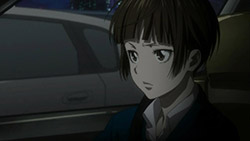 |
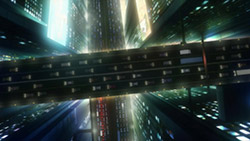 |
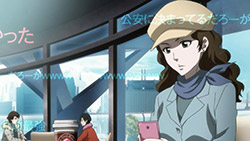 |
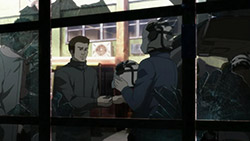 |
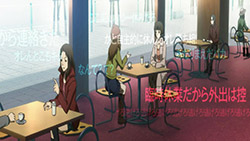 |
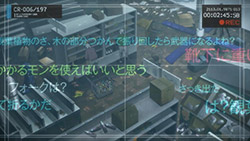 |
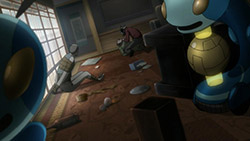 |
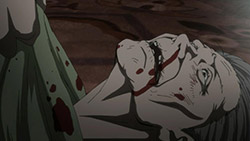 |
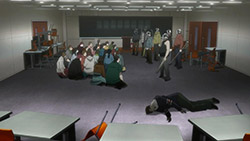 |
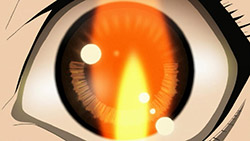 |
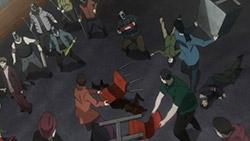 |
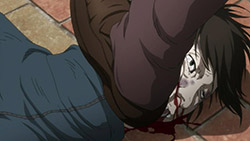 |
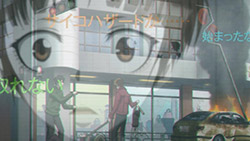 |
 |
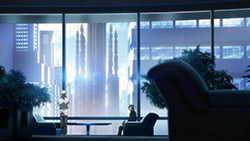 |
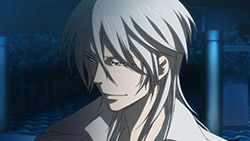 |
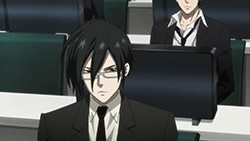 |
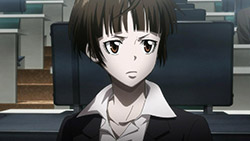 |
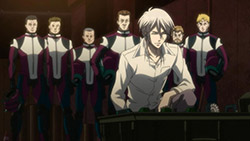 |
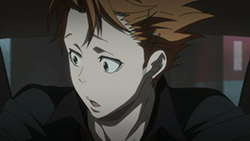 |
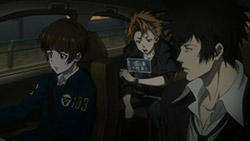 |
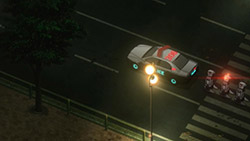 |
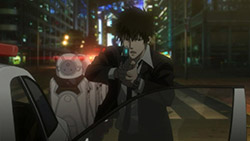 |
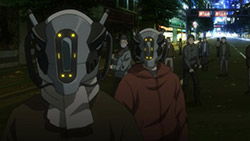 |
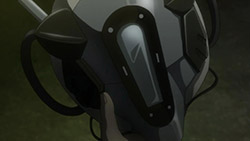 |
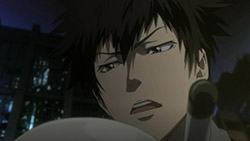 |
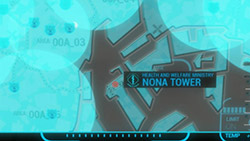 |
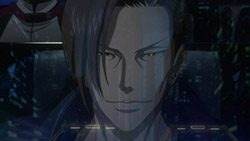 |
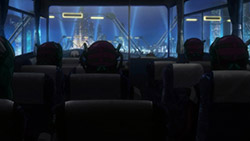 |
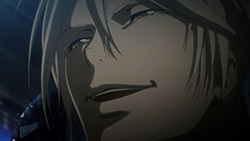 |
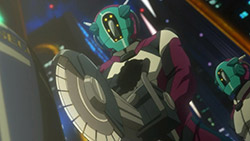 |
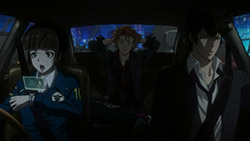 |
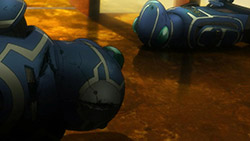 |
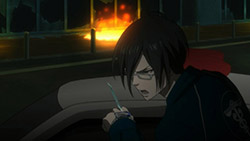 |
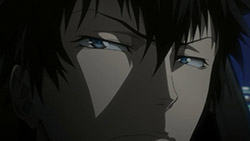 |
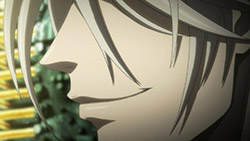 |
「硫黄降る街」 (Iou Furu Machi)
“The Town Where Sulphur Falls”
Do androids dream of electric sheep?
A seemingly innocent discussion of authors reveal a much more philosophical debate at hand, peeling back the layers that have firmly kept Makishima and Choi Goo Sung shrouded in enigma. From simple things such as a preference for paper books over cyber copies to more complex matters regarding iconic writers that represent different ideals, Urobuchi turns the tables on the duo in such a way that they go from “antagonists” to “anti-heroes”.
The association of Makishima and Choi Goo Sung to anything “heroic” or “just” seems impossible at first glance, but what is important to keep in mind is that words are relative, meaningless without context. A “hero” is only a hero because those around him elevate his deeds based on predetermined notions of what can be considered worthy of praise. However, these notions are different for every person, and if the exchanges between the two characters are anything to go by, it is that in their respective stories they are very much heroes. This is more true for Makishima than it is for Choi Goo Sung, who seems like an anarchist with purely self-motivated values – it is solely his curiosity that drives him, to test the limits of and break apart a system that seems to challenge the logic of everything he knows. A strict modernist, he’s firmly detached from the events transpiring in the series, partnering with Makishima purely out of a necessity to satiate his own needs rather than an alignment of ideals. In that sense Choi Goo Sung is perhaps more dangerous than Makishima himself, who reveals quite a weakness in his conversation with his accomplice.
Unlike Choi Goo Sung, Makishima is a traditionalist. He reads paper books in an age where they should have probably become a rarity, and aside from the reasons he gives, his adherence to such an outdated concept symbolizes a strong dislike of the world he lives in now, and the changes that came with it – most notably the loss of independent action. His preference is also marks him as quite the romanticist. Common connotations of romanticism (e.g. idealistic hero) may prevent an immediate connection of Makishima to the concept, but his actions and motives belie a man firmly convicted of his own heroism, a man who not only believes, but is convinced his rebellion will right the wrongs committed in the city he was “born and raised in”.
And there it is – an unconscious yet nonetheless startling revelation of Makishima’s weakness:
”僕にとっては生まれ育った町だ。切実な問題だよ。”
“To me, it’s the town where I was born and raised in. It’s a pressing issue.”
What a surprisingly personal thing to say. Or perhaps it’s not surprising at all. For a human being to cause so much chaos and remain utterly composed, for a perfectly sane person to continue walking forward despite the blood and mayhem around him, he must have a conviction so strong it overrides any moral conscience that would normally cause hesitance, a hesitance that would cloud anyone else’s psycho-pass a cloudy hue. The “town where [he] was born and raised in” could just as easily be summed up with a word that holds a lot of intimate, emotive associations: hometown. Positive or not, a person’s hometown is significant – it is where their life began, where they were first introduced to the world at large. If associations with their hometown are positive, all the more enraged someone would become to see it come to ruins at a totalitarian system that robs people of their futures and emotions. This ties strongly back to his earlier conversation with Choi Goo Sung, where Makishima states his preference for Phillip K. Dick over George Orwell and William Gibson.
All three authors are not overly familiar to me, as the only exposure I’ve had to Orwell is through 1984, which is arguably his most famous work aside from Animal Farm, but is not enough to make any solid deductions on his general philosophy. Same goes for Dick, whose works I’ve never read per se – Blade Runner and Total Recall (both the ghetto and the shit versions) are not wholly reflective of the literary works they are based off of. Even harder is Gibson, who I had never heard of period until this series. Based on Makishima and Choi Goo Sung however, it is entirely possible to draw some general observations. Orwell and Dick’s works primarily deal with the concept of free will and by extension, it can be assumed Gibson’s works deal with similar themes, although perhaps to a lesser degree considering Choi Goo Sung’s nature.
In analyzing why Makishima prefers Dick over Orwell and why that is significant, it is necessary to look at the trajectories of the “heroes” in each author’s stories. Orwell’s works are thoroughly dystopian and pessimistic, with characters finding themselves ending in the same place they began, or in worse situations. There is no progression – if anything these characters go through regression; their development is not enough to defeat the circumstances and they’ve arguably taken two steps back after being given a small taste of the forbidden fruit. Those that succeed are not the characters that the audience experiences the story with or are victimized unfairly by a corrupt system, but the “antagonists” whose power is simply too much for the protagonists to handle. On the other hand, Dick’s characters experience some form of forward motion – even though their successes are not as plain as a fairytale prince defeating a dragon and winning the princess’ hand, at the end of their journey they’ve achieved a small measure of victory that implies the system is not strong enough to completely dominate individual will. To put it in very simple, black and white terms, Dick is optimistic while Orwell is pessimistic.
One other factor to consider before delving into Makishima’s preference is his inclination towards the traditional and the romantic. His description of the idea of reading a paper book is highly romanticized, and the idea of e-books being “insipid (味気ない)” compared to them suggests he places a specific value on the notion of physically flipping through the pages. It certainly isn’t a sentiment that’s unheard of – there’s something infinitely more engaging about seeing the words in ink and feeling the weight of the book. For some people those particular things make the reading experience more immersive, and it becomes much easier to imagine themselves as a part of the story. The personification of books and the contemplative manner with which he approaches the act of reading all make Makishima a surprisingly sentimental individual, andit’s not a stretch to assume he likes to place himself in the story’s universe, particularly in the role of the “hero”. He prefers Dick’s stories since of the three that write about the type of world he lives in, Dick offers a version that aligns most closely with his philosophy and the things he wants to see.
The issues dealt with in the author’s short stories are the same things Makishima finds himself grappling in reality, and it’s highly possible he considers himself living out a story – a story where it falls on him, the only person seemingly aware of the ridiculousness of the Sibyl System, to fight against the force that threatens to destroy free will.
Makishima’s perspective is intriguing since it adds another layer to PSYCHO-PASS that wasn’t apparent before. If its society is a “parody” of the world in Do Androids Dream of Electric Sheep?, what role does each character have? Who is the protagonist, and who is the antagonist? Urobuchi Gen is particularly good at twisting perspectives, convincing viewers that something is correct from one angle but turning that immediately around by giving them another angle to look at things from. Before, the Enforcers were in the “right”, chasing a villain who seemingly caused chaos everywhere with no discernible reason. Now, Makishima seems more like an anti-hero, and one has to wonder if his goals are truly “wrong”. Isn’t free will a right and not a privilege?
Note: I’m not sure why subs are using “Choe” instead of “Choi”, since that’s the most common romanization of the Korean last name. But I’ll be using “Choi” since it’s the more common/modern version. That and “Choe” just looks bastardized.
Full-length images: 2, 3, 5, 7, 9, 17, 24, 25, 26, 29, 31, 33.
ED2.52 Sequence
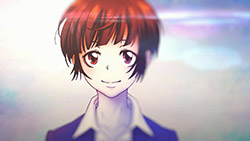 |
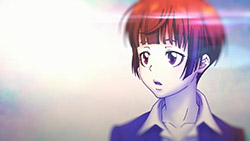 |
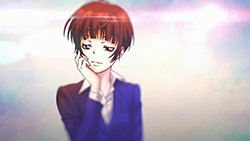 |
ED2: 「All Alone With You」by EGOIST

This is a great analysis of the episode; I’m always impressed by how you tie in the motifs and themes of the anime with the analyses of various sources and inspiration in it themselves. It certainly inspires the English major side of me, as well as being envious.
Thank you! 😀 RC’s been a good place for me keep my writing decently sharp – it’s not exactly the same as being in English class, but it’s close enough lol.
Good overview but how can you not have heard of William Gibson?
He is one of the most well known cyberpunk authors out there. Burning Chrome and Neuromancer are two must reads for any sci-fi buff.
To be fair, Neuromancer was written 29 years ago (on a manual typewriter!), and I find some of Gibson’s recent stuff just annoys me as it reads more like some kind of trendy lifestyle magazine copy.
I agree with your reading recommendations, and would add Count Zero and Mona Lisa Overdrive as they form a kind of trilogy with Neuromancer.
Me neither, only ever read George Orwell’s 1958
This is the Sybil System
That, or something along the lines of GUNNM / Battle Angel Alita: Last Order’s Melchizedek – a super computer made up of several connected cerebellum.
That would be because I don’t read the sci-fi genre ;__;
I tried to read Ender’s Shadow a loooooong time ago and that’s all the sci-fi I’ve “read”.
have you already read Ender’s Game? 😮
I encourage you to give William Gibson’s works a look. I’ve read a few and they’re great. In particular he does an excellent job of working the consequences of modern computers and networks into his books – arguably he’s one of the people who established what we think of as ‘cyberpunk’ these days. Neuromancer is absolutely a classic, though I honestly can’t remember which of his other books I read… long time ago.
Nice to see someone picking up this great show. Thanks Mochi!
With Philip K Dick(PKD), his stories were significantly influenced by his mental state. It is no secret that he suffered from schizophrenia and he was extremely paranoid about the world. Much of his stories revolve around the notion of what is real, what is fake and what does it mean to be human. PKD’s novel “Do Androids Dream of Electric Sheep?”, referenced in this episode, is a good example of what is typically PKD. I guess that Makishima asks those very same questions of the world around him.
My thoughts on this episode:
1) A bit of ultraviolence really wakes you in the morning.
2) There is nothing like the smell of of a real book.
3) I wonder what a well placed EMP bomb will do?
That’s the thing that stikes me the most. More and more people, including my friends, are using E-books more often sans hard copy study notes. Though they are more convenient and cheaper then conventional ones, there’s nothing better holding an actual book in your hand.
I disgress that the urge to find a cute girl under a tree holding a paperback book would be good too.
In just 7 hrs. mayhem occurred. So much violence although I think I am lucky to not see any rape scene for my heart is weak in those type of scenes.
they already gone ever that topic in the first ep 😛 rehashing isnt their style! there hasnt been much looting yet … so they looot! but it was surprising that the people that are considered honor students actually strike back i thought they were all gonna be slaughtered cuz theyre only white collared and easily give up in a fist fight…. but nope they can go ape shit too if pushed that far!
I am surprised you managed to write a whole piece regarding one short conversation between Choi Goo Sung and Makishima, and not much on the chaos which, to me anyway, has changed the tone of the series completely compared to the first half of the episode. Not that I am saying that this piece was bad (I thoroughly enjoyed seeing someone’s point of view of the two villains).
This episode brought out a good point to me – who were the real victims in the riots? The ones with the helmets or the ones defending themselves? Those with the helmets were driven into a corner by the system which was meant to make life better, forcing them to hide in the shadows or be forced to accept that they will never get anywhere in life. Granted, some of them had gone completely insane (the whole lighting the girl up on fire scene was definitely one of the most extremely violent scenes I had seen in an anime in a long time). But without such a system, they may not have committed any crimes to begin with. The helmets were a method of breaking out of the shackles and rioting against society.
Those who were defending themselves are of course victims too. If they don’t defend themselves, then how will they survive? But their mentality is just as messed up too. The whole “It is okay to murder if it is in defense so our crime coefficient won’t rise” is pretty messed up considered some of those they attacked may not have been helmet wearers either but just innocent bystanders.
No doubt this series is showing an extreme example of how easily a society built upon a system which pretty much dictates what a person can do in life can crumble. Although on the surface, everything seems orderly. But take away order, and everyone becomes nothing but a lowly animal.
Here you go.
Although the mayhem was interesting, between that and Makishima, I find the latter more interesting. Not to mention this is the first instance we got to know more about the series’ supposed “antagonist”, so I made the necessary sacrifice.
As to the argument who the victims are, it would depend on people’s personal definition of victims. I suppose if you’re looking at the helmet-wearers as being manipulated by Makishima, then yes, they’re indeed “victims”. And if you look purely at the end result (them being killed) then yes, they’re “victims” in that respect as well.
However you do have to keep in mind that no one told them to commit crimes – Sybil may have driven them into a corner, but the system didn’t force them to light a girl on fire just as it didn’t force the citizens to kill for self-defense. The violent acts are self-perpetrated, so strictly in that aspect, no one is a victim here.
The only cases in this episode that can truly be considered victims (both in the denotational and connotational sense) are the woman on the sidewalk and the old people being robbed at the beginning of the episode.
Talking about the Sybil System, there are rumors floating around that it may not be entirely mechanical in form but rather a cyborg, part human part machine just like that hunter in the earlier episodes.
Knowing Urochi, it may not be such a far-fetch idea.
On another although Makashima is technically the “bad guy” in this series I can’t help but want to see through his plans. If it was any other dystopian work, the system is usually the bad guys while the resistance fighters are the good ones.
Sybil being part human-part machine would be an interesting twist, so far it has been criticized that humans in PP world are letting a computer AI dictate their future for them with extreme indifference, so what if Sybil was in fact a human interfaced with a super-computer .. i wonder what impact that would have !!?
Yeah, we were throwin’ the idea of a human/cyborg runnin’ the show around (specifically the Ministry’s Chief herself) after EP13 when the Chief had that crazy eye thing going on.
But if this episode really hammered in anything, it’s how likely that’s the actual possibility-or at least, the human/cyborg part. The human brain is equivalent to 100 million processors in the end, which at the moment seems to be the only possible thing that can process everything the Sibyl System needs to.
I was thinking alien/AI tech before…
Now consider…if Chief = Makishima’s mom, and also part of Sybil…Mommy’s kid is never bad so Makishima’s hue is always perfect 🙂
Rather than rumors, I think it is fairly obvious that at least a human brain is part of the sybill system, considering Choi’s monologue about what he found out while investigating it. According to him “the sheer throughput it must have is beyond what should be possible with current technology” and the brain is the one thing that is (and probably always will be) the only thing with a higher data processing rate than even the best supercomputer.
Although if they actually found a girl at the core of the system, Makishima’s last comment would become fridge brilliance. They would literally find the Great Prophetess in the heart of the Great Prophetess.
And so the Sybil System is pretty much like a Pre-Crime unit after all!
There’s supposed to be at least 2 more seasons. I wonder how it’s going to develop…
A girl or an older grey-haired lady?
Maybe a mamallian/reptillian pod like peacewalker.
Fantastic analysis, although i also wished you touched upon the events that happened aside from the conversation between Makishima and Choi Goo Sung (which i admit was very interesting and the most important scene in the episode), things like the how the feeling of helplessness and despair made the normal people snap and fight back against the helmet people with extreme prejudice (to me the helmet here seems more like metaphor representing discrepancy in society more than it is an actual object) .. it’s interesting that this helplessness and despair are what made the helmet-people seek out the helmets in the first place .. so while Sybil indeed does it intended job perfectly (as people talked on the internet at the start of the episode .. they said this city has no killing .. in regards to the murder video which they called a fake !!!) is it really to blame for all teh killing and murder that happened .. or is it Makishima who gave them the helmet or the people who committed those crimes are the ones responsible for their own actions (instead of just using their helplessness and despair as an excuse to commit crimes) !!? .. seeing the responsibility and freedom are tightly knotted together .. should there be responsibility without complete freedom or not .. as in .. can we hold the people who killed and robbed and destroyed the city responsible for their actions (which they could have chose not to do) or does all the blame fall on Sybil !!!?
It’s also interesting to see how small is the police force responsible for protecting the entire city, guess Sybil really worked in eliminating crimes so well that people became overconfident in it and let their guard down to the point where they don’t even have riot police or enough police members to deal with a riot.
Finally .. i wonder if it was a good idea to place a Sybil singular super-computer in a single place and above ground (apparently and from what i understood from Choi Goo Sung, Sybil central computer handles all the processing of data and broadcasts/receives date directly to/from its peripherals) .. so none of the Sybil related facilities and peripherals does any processing .. which makes the Sybil super-computer according to Choi something that isn’t possible with their current tech .. wonder what that means !!? what kind of surprise will be waiting for us into that building !!?
I also have to add the Gibson is one of the founders of the Cyperpunk genre in Sci-Fi and his book Neuromancer inspired many other cyber-punk animes, movies, books .. like Ghost in the Shell.
I wouldn’t be surprised if Sybil were some kind of hybrid hive-mind, part computer and part human brains from all the criminals who disappeared without a trace (asymptomatic psycho pass hue). Just saying.
i said that 2 episodes ago on randomc, everyone only now catches up and makes it sound like they thought of it 😀
http://youtu.be/dyVCCD9OrbQ
Makishima has become the darker version of V in V for Vendetta, distributing all those masks out, though mostly to Sybil-branded psychopaths, knowing they will wreck havoc and in turn provoke those non-psychopaths to respond violence with violence, for under protection from Sybil for so long, they will not know of any other alternative to respond.
Very interesting analogy .. the spreading of the helmets surely has a lot of resemblance with the masks being delivered to people in the V for Vendetta story .. of course with completely different results.
genius.
They are quite similar. The only difference is that Makashima didn’t make those for everyone.
in fact he didn’t make them at all, he stole most of them from drones transporting them somewhere
Makashima already has a few sets with him. All he had to do was make an order for its mass production, had it delivered somewhere else and steal it.
The plot in Psycho:Pass sure picked up in this second season and I’m loving every minute of it. Makishima is really proving himself to be quite an interesting antagonist – the man’s got a plan, everything he does is for a reason, and, well, I can’t say I fully disagree with him or the hacker. The way he does it is horrific for sure, but considering what a flawed and messed up thing the Sybil system is, maybe it’s collapse would be for the better. After all, if this episode proved anything, it’s that the peace brought by the Sybil system is a false one. People haven’t grown more peaceful, they’re just pacified. And then something like this happens, people start getting violent and the system only makes it worse – as a lot of people are only concerned about their hue rather than doing what’s right (it’s like they’re addicted to it) – and all society breaks down.
Also, next episode will probably reach the point where the first episode flash forwarded too, so I’m expecting something big to happen.
Their use of a rumor-spreading AI was brilliant, you have to admit, especially since the AI seems to be filtering itself into forums and chatrooms, disguising itself as just another “concerned citizen”.
I do believe even Shion would be hard pressed to figure out which was AI chatter and which human.
And speaking of the ordinary non-helmeted citizens, I think they’re response to the violence can be summed up with two quotes from the Joker (The Killing Joke) of all people:
– “Ladies and Gentlemen! You’ve read about it in the papers! Now witness, before your very eyes, that most rare and tragic of nature’s mistakes! I give you: the average man. Physically unremarkable, it instead possesses a deformed set of values. Notice the hideously bloated sense of humanity’s importance. Also note the club-footed social conscience and the withered optimism. It’s certainly not for the squeamish, is it? Most repulsive of all, are its frail and useless notions of order and sanity. If too much weight is placed upon them… they snap. How does it live, I hear you ask? How does this poor pathetic specimen survive in today’s harsh and irrational environment? I’m afraid the sad answer is, “Not very well.”
– All it takes is one bad day to reduce the sanest man alive to lunacy
Yeah, I think that should nicely sum up the situation.
On Makishima & Co…. nice work with the diversionary tactics aka divide and conquer, or in this case sneak attack. Still, I can’t help but feel it won’t be as easy as they think to get to Sybil system. Sure, the tower might be lacking in man power and the drones above floor are useless thanks to those helmets, but surely below ground or wherever Sybil is located security must be tougher.
The creators and maintainers of the system wouldn’t have been that lax in security.. could they?
Interesting note – Makishima’s enjoys Gibson, Orwell and Dick… notice anything about what you get if you add the first letters of those surnames together?
The Internet AI made me chuckle – those cyber comments were clearly a jab at online communities (e.g. NicoNico, reddit, netizens, etc) and how things tend to snowball faster than lightning. All the AI probably needed to do is make one comment and let things fall into place naturally.
And as for Gibson, Orwell, and Dick – I never noticed it before LOL.
I’m surprised that both you and Kinny Riddle brought up 2 masterpiece by Alan Moore (“Batman: The Killing Joke” and “V for Vendetta”).
Interestingly enough, Psycho-Pass is the second anime in my watchlist to have a references of Moore’s work, with Code Geass R1 and R2 being the first one. Based of my observation, Code Geass contains references to “The Killing Joke”, “V for Vendetta”, and “Watchmen”.
They probably spelled it ‘Choe’ because it’s phonetically closer in Japanese sense.
While ‘Choi’ is sort of official Korean romanization, it is just spelled according to the way it’s written in Korean alphabet and not to its actual pronunciation. It really sounds more like Cho-eh/Chwe.
This is one of the reasons why people have a hard time pronouncing Korean words and names compared to Japanese which is more phonetically romanized.
If you’re going by phonetic romanization, then instead of “Choe” it should’ve been “Che” – that’s actually the closest version to the actual pronunciation and how the romaji spells it.
Looking at Wikipedia, “Choe” looks like a really old way of spelling Choi; the recent names all use the latter.
Anyway, Choi is a weird one. I’m sure there are more, but I can’t think of any other weirdly-spelled Korean names atm.
Words of advice, not that I don’t enjoy your character analysis…but you should really start talking about the things that happen in the show more often. There’s multiple cases where you don’t talk about the events and only focus on the philosophy behind the show.
But if you’ve watched the episode, why the need for a summary?
Nice work Bakamochi !! the ED really show how cute Akane is!
man i really hoped the show would introduce more interesting killers before hitting the high note, it deserves a lot more than just 2 seasons…and apparently choi goo sung possesses the eyes of the spirit king lul…
i wonder if yayoi’s story will ever get tied up…
My hat is off to the producers, and more than anyone, to Urobutchi (I can even forgive his penchant for ultra-violence, since it actually plays major role in the plot).
On authors:
Orwell, a british socialist, went on to Spain during communist-fascist in 1930s and witnessed how revolution is betrayed by its makers, with resultant Stalinist purges and totalitarian state. Both this and WW2 has driven him to write both Animal Farm and 1984 as political warnings. Had Cold War turned hot in the Korean War era, his vision of devastated world of perpetual warfare and totalitarian regimes could have been realised.
Gibson, a prophet of cyberpace, was writing about humanity in cybernetics-dominated landscape. His works might seem aged when compared to modern technology, but questions he asks about relation of humanity and technology are valid.
Dick, with his mental health issues is possibly most fascinating because he 1005 sure would not pass the scanners of the Sybil system. His works , in my opinion, tend to focus on individuals perception of reality, and illusions our minds create. One book, not mentioned here, yet worth reading, is The Man from the High Castle, an alternative-history of Nazis winning the world war 2 and echoes of our reality passing thru the readings of chinese I-ching prophecies into mind of writer who manages to create an in-story fictional story where Germans were defeated by British relief force at Stalingrad…
On another note, isn’t it fascinating to see how from chaos, people start to learn how to deal with crime when the Sybil system fails. Vigilantes hunting helmets, people acting in self-defence up to and including killings, and re-inventing makeshift weaponry thru the net talk. It seems that Makishima believes world would be better place even with all the violence, but without Sybils stifling strangehold on everyone’s fates, while his companions is treating this more as a social experiment wanting to know what happens if we turn Sybil off.
I wonder too why Sybil was created around single location making it vulnerable to attack, especially considering there were active anti-Sybil groups around (as per the anarchist music band). Furthermore, the mention of the Sybil not being possible by current technology means something is really out of place – alien technology? something supernatural? Whatever it is, I am as curious as Makishima’s companion about it!
I like the post dedicated mostly to the conversation and the background/analysis of it. I don’t think it’s necessary to have a summary of the episode, unless there was like a specific summary or section. Otherwise I think it’s just fine to list your thoughts on the episode and whatever you want to focus on it. Ultimately I still think of randomc as a blog (with many people contributing to it), and as such generally can have whatever the author wants to write and talk about in the posts.
Anyway, in regards to the post, I’ve heard of Gibson but also never read anything by him. I’ll definitely have to check out some of his work, especially his first works it seems since that seems to be his best work based on other posts. Keep up the good work Mochi.
I’ve just had a nerdgasm watching this episode…
It’s also interesting to see how small is the police force responsible for protecting the entire city, guess Sybil really worked in eliminating crimes so well that people became overconfident in it and let their guard down to the point where they don’t even have riot police or enough police members to deal with a riot.
You don’t need a lot of sheep dogs to control sheep or cowboys to cows. The people in this city are more cattle than human. They have given up all responsibility for their lives to a machine and almost programmed/trained to be animals.
David Gerrold in his ‘War of the Chtorr’ series touches upon what he sees as what is ‘human.’ The first book ‘Matter for Men’ hints at it as being responsible for your life, which inlcudes all your actions. To give that responsibility to another person or government just makes you cattle.
Sorry for my poor summary but the whole series is interesting. I’d recommend it if you can find a copy.
As for Psycho-Pass, it really is getting more interesting. With 10 episodes left you wonder what the final outcome for the city and it’s residents will be.
This anime has done what a serious sci-fi should do– start with the fantasy on a concept with a mighty scientific aura, which is the omniscient computer system Sybil in this case, and then beat it up to the ground. To me, the best sci-fi reflects upon human’s worship of science and the “progress” about which it brings. The morale of the story should uncover a blind spot in the collective consciousness of our society, and make us think twice about our faith in something we don’t want to question.
This episode reminds me of the season two finale of the Hell Girl (Jigoku Shoujo) series. In that finale, the community became fully aware of the existence of the Hell Hotline, and started abusing it. In fear of retribution, people started preemptive strikes against potential enemies. The community disintegrated; and riots were everywhere. This is very much like how people in this episode reacted. In this anime, the PSYCHO-PASS system that determines people’s fate before any crime is committed is unreasonable. When an unreasonable system is finally “hacked” (by the helmets), people’s faith suddenly collapsed and started taking laws into their own hands, all in the name of self defense. This is a powerful illustration of how too faith in an unreasonable system, no matter how mighty it appears to be and how much good intention is meant, is eventually a bad thing for the society. I suspect that if we look closer, we may as well find out something in real life with the same statue and the same problems as the fictional PSYCHO-PASS system.
I love how sleek and trendy this anime is. And also the narrative purpose of each and every character is so distinct: I love shows that use their medium, the some twenty minutes they have, to convey a message or ask a question of its audience, which is precisely what Psycho-Pass does. Questions about human rights, about freedom of choice, using violence as a voice, about dictatorships couched in goodwill. The trade-off between safety and self-expression. All questions that are so relevant even in today’s world, except twisted and thrown into a completely different context. I wonder if there’s a concrete conclusion – i.e. stand – planned for this show: I wouldn’t be surprised if it ended without one, since these questions have no right answers and are so subjective.
Also, I love Akane, and I’m hoping for more character growth on her part. THINK, GIRL. I’m sure if Psycho-Passes had existed in the time of the great philosophers, all of them would have been dyed jet black. Doubt comes part and parcel with deep thinking of any sort, imo.
Quite a great read, your take on Makashima and Choi, BAKAMOCHI. That was the part that stood out the most to me this episode as well. Looking forward to the next episode eagerly, and now also looking forward to read your thoughts on the next episode as well.
I wonder what happened to Korea in the PP verse. It collapsed, but how? What about other countries? I wonder if our heroes, such as they are, will wander beyond the walls of their city at the end, and walk into a post-apocalyptic world.
I’m actually wondering that myself – is the whole world like this? Korea is most likely in the same or worse state, but who knows about the rest of the world?
Interesting to see your perspective on the conversation as it highlights both of their characters extremely well. If anything, this episode allows us to appreciate how much information and thought provoking points Psycho-Pass can bring up in one episode.
I want to give big hands to Urobutch
…. wonderful directing skills and depict of brutal scene.. that:s all
Prefers to read e-book doesn’t make Choi a modernist. Please, don’t use the word “modernist” that lightly.
A modernist is somebody who believes in reasoning, logic and science. He/She is somebody who is committed to apply these principles to change the world (redesign everyday objects, plan a new city or re-design a social system). I can’t see these traits in Choi.
On the other hand, your reading on the three writers are probably correct. On Gibson’s part, Neuromancer is very much about the protagonist’s gang get coined by an AI into helping it achieving its end and have all their fates changed in the due course. I can understand why Makishima doesn’t like Gibson: in Neuromancer universe, it’s the AI which pulls the plug and decides who gets what, not humans. And the protagonist’s fate was pretty much shaped by the AI and he didn’t fight back that much.
Perhaps you misunderstood my usage of the word “modernist” then – I was using it in a completely literal sense to contrast the preference of the two characters, and “traditionalist” and “modernist” best encapsulated what I was trying to illustrate.
By your logic I shouldn’t be using “romanticist” to describe Makishima either, but aside from its traditional, dictionary meaning, romanticist can also be used to describe idealists or people who aggrandize ordinary sentiments.
I had a similar reaction to the word choice – to me, as an Individualist with an appreciation of the value of objects and the real, Makishima in fact is a Modernist. But I got BakaMochi’s meaning.
When watching the beginning of the episode, why do I keep getting the feeling Makishima is the futuristic version of Tyler Durden from Fight Club?
this is great your analysis was as great as the episode the conversation between makishima and choi was the highlight for me too, i have read orwell and also i’m studying his work i cn’t wait to read the other authors mentioned
Ah the genius of this episode! first the contrast between the scenes of rampage and mass violence and that calm conversation between makishima and choi, the reference to the fact that this is an insulated closed up society and the fact that the Sybil system, the center of power pretty much remains invisible and unknown to the people are also typical features of the dystopian society. It’s interesting to see how fragile this system actually is and how swiftly it crumbles down to leave the society with not even a semblance of order (or sanity ironically). One redeeming factor for makishima is that up until now all these people accepted the system and let it steal their lives. I like how he says about all this destruction:” if there is something beyond it that’s good, if there isn’t then I’ll accept it”
unlike zetsuen no tempest the references to literature and philosophy here are varied some of them are made obvious and others are more subtle and it opens much room for speculation everyone can interpret them in their own way. Also as usual with urobushi the line between good and evil is blurred between the system and makishima none is totally evil it’s the impact on society and the individuals that matters
Visually, there is a reference to Proust’s famous passage about the madeleine dipped in tea. I thought it was interesting, but you didn’t mention it. It was especially fun for me to watch because as a literature geek I was expecting Makishima to do something besides eat it. But he didn’t. Still though, that reference to Proust when held up along with the comparisons between Orwell and Phillip K. Dick shows that as a reader Makishima is actually quite a snob. And his recommendation of “Do Androids…” to Choi seemed like an implied insult to me, mainly because that weird yellow coloring of his eyes makes me think he’s a cyborg (i.e. why he enjoys electronic editions rather than “traditional” paper and print). I honestly wouldn’t think of Makishima as anything approaching an anti-hero. He’s made out too unsympathetically.
Although, I do think your interpretation of his sentimental weakness is really interesting. He is human, we all know that, despite being able to kill without hesitation. But ultimately what enables him to do so without psychological consequence is selfishness. His sentimentality is keeping him human but rather than making him sympathetic the chaos and destruction he spreads juxtaposes that almost innocent reasoning behind his motivations. I do believe in your viewpoint that Makishima may be idealizing himself as a “hero” in a story. But I wouldn’t consider him as one at all.
A hero isn’t made when they do good things through bad means. A hero is made when they suffer and sacrifice for that good thing. Makishima, just by looking at that picture of him smiling, seems almost impervious to human pain. I seriously doubt the good that he will bring by collapsing the Sybil system. Rather than doing it to free mankind like a slave of its shackles he seems to be pulling off the life support of an already dying patient. And I don’t think he doesn’t know this either. He seems to be doing it on purpose.
And if he actually thinks of himself as a hero for doing so, that’s a misguided ego, not a sound rationale.
That’s one of the most difficult things about writing posts… so many things to talk about, yet so little space. That madeleine screamed SYMBOLISM to me, so I wanted to add it somewhere since I knew I wasn’t going to be able to talk about it lol.
I think if Makishima does consider himself a “hero”, he’s a sound psychopath. I avoid calling him that since when people say “psychopath” they tend to think chainsaw-wielding, uncivilized killers, but that’s not true at all – the scariest psychopaths are the calm ones, ones who are completely convinced their way of thinking is correct.
But isn’t the need to view ones-self as good or a hero, in this case, derived from the fact that he needs to justify himself, but for Makishima who has no sense of psychological consequence or guilt,wouldn’t it be more likely that it wouldn’t be necessary.
Personally I think collapsing the Sybil system will be a good thing long term – if the chaos continues it’ll be bad thing, but this current state is the initial state of chaos that comes with any major change in a system.
I think it’s more like trying experimental medication on a dying patient taking the gamble that the patient might die instantly or be cured.
(I don’t actually watch this show, because horror genre doesn’t really appeal to me.But I do follow the posts and was replying only to what is written here.)
You’ve never heard of William Gibson, the man who, more or less, created the cyberpunk genre. Go read Neuromancer and you’ll understand Makishima’s comment about how fitting it is for a hacker to be a Gibson fan.
Hiya, I’m genuinely glad There truly is this particulars. Today web owners publish just about gossips along with internet and this really is really annoying. A good site with fascinating written content material, that’s what I’d like. Thanks for maintaining this website, I’ll be visiting it. Do you need to do newsletters? Cant think it’s.